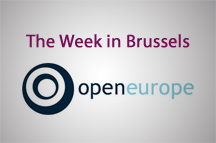 The EU agenda was this week once again dominated by events outside of the EU: in Ukraine. Amidst unrest in Eastern Ukraine, Russia came out stating that “erroneous EU policy” really was to blame for the crisis, a clear attempt to deviate attention from its own obviously unacceptable behaviour but which contains some truth as well.
The EU agenda was this week once again dominated by events outside of the EU: in Ukraine. Amidst unrest in Eastern Ukraine, Russia came out stating that “erroneous EU policy” really was to blame for the crisis, a clear attempt to deviate attention from its own obviously unacceptable behaviour but which contains some truth as well.

As we pointed out with Open Europe, it was wrong to effectively try to force Ukraine to choose between Russia and the EU, something which German Foreign Minister Frank-Walter Steinmeier has acknowledged. At least the EU decision to unilaterally open up trade to Ukraine is a step in the right direction, despite the protest against this by special interest groups in Brussels, like the agricultural lobby.
This week also marks the first time since 2010 Greece manages to borrow in markets. The country, which sold €3 billion of five-year bonds at an interest rate of 4.95%, has a record high debt to GDP ratio of around 180% to GDP, its so-called “primary surplus” is questionable as it wouldn't include certain military expenditures, social security, municipal budgets and the cost of running state enterprises, Greek banks are still very ill and the political situation is far from stable, given that far-left SYRIZA is leading in the polls. The main reason why investors lend to Greece is therefore the expectation that the country won't be forced to leave the Eurozone and will remain funded by other eurozone states, also because lending happens on a short term basis.
Furthermore, there was the ruling by the European Court of Justice (ECJ) on Tuesday which declared the EU’s Data Retention Directive, which requests telecommunication services providers and operators to store certain categories of information, to be “invalid” because it violates the principle of proportionality. Germany was the only country not to have implemented the directive, as opposed to other countries like Sweden, who received a €3 million fine for delaying implementation.
 On Wednesday, the European Commission came forward with new proposals aimed at boosting shareholders’ rights, which would see them given greater say over the salaries of corporate executives, potentially even setting a cap on the difference between their salaries and those of other employees. Around 10,000 listed companies would be hit by the rules which are not expected to be agreed until 2015.
On Wednesday, the European Commission came forward with new proposals aimed at boosting shareholders’ rights, which would see them given greater say over the salaries of corporate executives, potentially even setting a cap on the difference between their salaries and those of other employees. Around 10,000 listed companies would be hit by the rules which are not expected to be agreed until 2015.
In the run-up to the European Parliament elections, opinion polls continue to be published. According to a new one, the Eurosceptic Danish People's Party would become the biggest party in Denmark. In recent months, anti-establishment parties have been polling as the biggest party in the UK (UKIP), France (FN), the Netherlands (PVV), Greece (SYRIZA) and Austria (FPOe). In Austria, the leading candidates on the lists of two far right parties, FPOe and BZOe, stepped down this week: one over racist comments and another because she wasn’t considered to be EU-critical enough by her party.
Last but not least, on Wednesday a so-called “freestyle hip hop battle” took place in the European Parliament in Brussels, featuring MEPs, with the stated aim “to get young voters interested in European politics and the upcoming elections.” It may have received more attention than the first TV debate between candidates battling to become Commission President, the centre-right Jean-Claude Juncker and Social Democrat Martin Schulz, who according to EurActiv “struggle to find differences” between each other.














